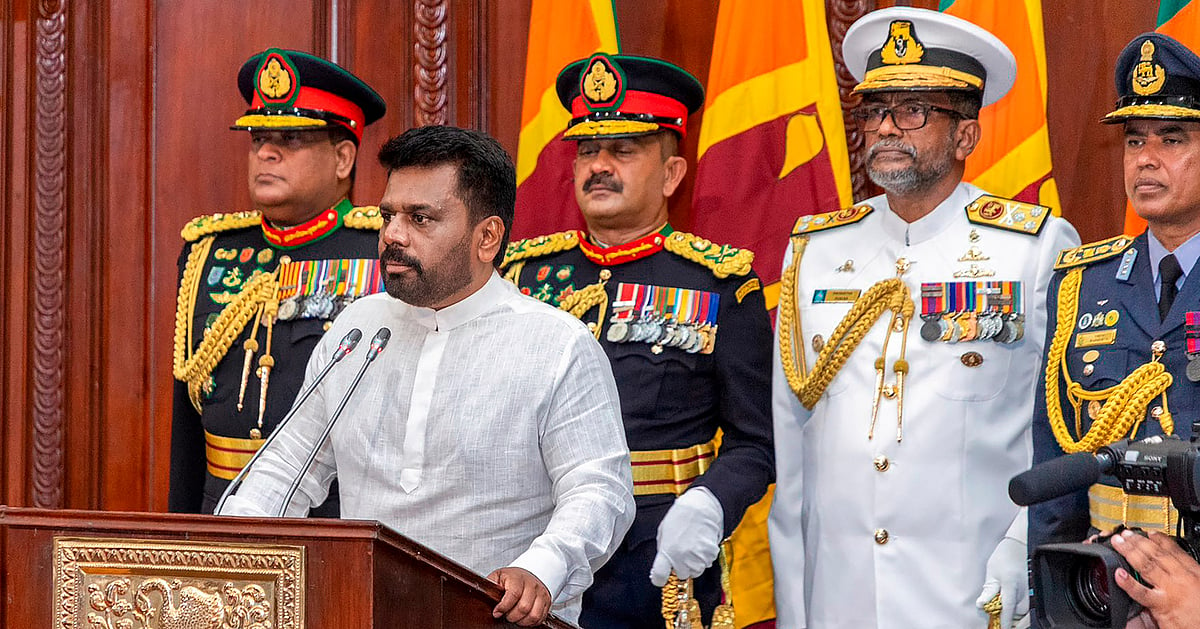Sri Lanka’s political landscape has undergone a significant transformation, with the rise of a Communist ideologue at the helm of its governance. The island nation’s latest political shift, spearheaded by an ideologically driven leader with Marxist leanings, has raised eyebrows in the region, particularly in India. As India observes its neighbor’s realignment, concerns about the possible ramifications—both geopolitical and economic—come to the forefront. Sri Lanka has always held a crucial position in South Asia, not just because of its geographical proximity to India, but due to its strategic location in the Indian Ocean. Any significant political change in Colombo has the potential to influence the delicate balance of power in the region. The rise of a Communist leadership brings in an entirely different ideology and approach to governance compared to the traditional leadership in Sri Lanka. This political transformation could have ripple effects on the island’s foreign policies, which might now take a more leftist, non-aligned stance, reminiscent of Cold War alignments. A Communist-led government often seeks to emphasize self-reliance and a redefinition of ties with external powers, especially capitalist democracies. In this scenario, Sri Lanka’s relations with India, which have been growing steadily in recent years under the framework of strategic and economic partnerships, could become more strained. The Communist government may choose to pivot towards nations with similar ideological leanings, such as China and Russia, whose political systems and economic models better align with Marxist principles. This potential shift could place India in a precarious position as it seeks to maintain its influence in the region. India’s primary concern lies in the potential for a stronger Sri Lanka-China axis under the new Communist leadership. China’s increasing foothold in Sri Lanka has been a contentious issue for New Delhi over the past decade. Beijing’s heavy investments in the country, especially through the Belt and Road Initiative (BRI), have turned the island into a strategic point for Chinese interests in the Indian Ocean.

A Communist leader in Colombo could be more welcoming to China, as the ideological kinship between the two nations offers a foundation for closer ties. If Sri Lanka were to become even more dependent on China economically and militarily, India’s strategic interests in the Indian Ocean could be jeopardized. This could manifest in more Chinese influence over key infrastructure projects, ports, and potentially military access to Sri Lanka’s shores—a nightmare scenario for New Delhi. From a security standpoint, India’s southern borders could face significant vulnerabilities. Historically, India has viewed Sri Lanka as part of its immediate sphere of influence. A Communist-led Sri Lanka may adopt a more independent or adversarial stance on Indian security concerns, particularly concerning regional maritime security, which has been a cornerstone of India-Sri Lanka cooperation. If Colombo decides to distance itself from India and grow closer to China, the Indian Navy’s role in the Indian Ocean could face new challenges. China already has a major presence in Sri Lanka’s Hambantota port, and under Communist leadership, more such arrangements could materialize. A militarily closer relationship between Sri Lanka and China could undermine India’s own maritime security strategies. Furthermore, the Communist government might also reopen wounds of the past, such as the Tamil issue, which has long been a sensitive topic in both Indian and Sri Lankan politics. If the new leadership stirs this pot, it could lead to tensions in India’s southern states, particularly Tamil Nadu, where sentiments about the treatment of Sri Lankan Tamils remain high.
Economically, a more isolationist or self-reliant Sri Lankan government may weaken its ties with India, especially in terms of trade and investment. India is Sri Lanka’s largest trading partner, and any disruptions in this relationship could lead to economic consequences for both countriesThe ideological push towards state control over key sectors might deter Indian private sector investments, which have been steadily growing in Sri Lanka. Diplomatically, India’s challenge will be to recalibrate its approach to Sri Lanka, ensuring it does not lose its foothold in the region. Engaging with a government whose ideological leanings conflict with India’s democratic values will require a delicate balancing act. New Delhi must tread carefully, using both soft and hard power to maintain its influence over its southern neighbour. Already, Nepal, the Himalayan kingdom which was until recently the world’s only Hindu nation, has slipped into Communist hands, with its leanings towards China growing significantly. Against that backdrop, Sri Lanka’s shift under a Communist ideologue presents India with a new set of challenges. The potential for closer Sino-Sri Lankan ties, coupled with a shift in Colombo’s foreign and economic policies, could leave India vulnerable, especially in terms of maritime security and regional influence. New Delhi will need to proactively engage with the new leadership, safeguarding its interests in the region while closely monitoring the evolving geopolitical dynamics in its backyard.






